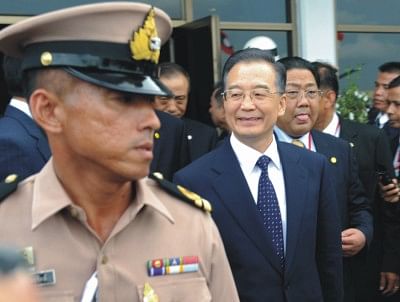Asian powers in phone diplomacy on N Korea

Chinese Prime Minister Wen Jiabao (C) walks prior to his departure from at U-Tapao military airport yesterday. Thundering low over this Thai beach resort, helicopters airlifted bewildered red-shirted foreign leaders in extraordinary scenes after a swarm of red-shirted protesters stormed the summit venue. Photo: AFP
The foreign ministers of China Japan and South Korea yesterday had to resort to telephone diplomacy over North Korea's rocket launch after Thai protesters scuppered a three-way meeting.
Hundreds of anti-government demonstrators targeted the hotel here where the top Chinese and South Korean diplomats were staying, preventing their Japanese counterpart from entering for talks on the sideline of a regional summit.
But Hirofumi Nakasone, the Japanese minister, said the three East Asian nations had held their first discussions on the issue in separate telephone conversations and agreed on the need for a strong response to the North.
"I discussed the North Korean issue with the two ministers," Nakasone said in comments to reporters aired by Japanese broadcaster NHK.
"I said it's important for the international community to jointly send a unified, strong message without any delay. And the two ministers have possessed similar ideas."
Kyodo news agency quoted Nakasone as saying that the three countries had reaffirmed that it was undesirable for Pyongyang to take actions that undermine peace and stability in Northeast Asia.
Officials from their delegations said the meeting was cancelled after Chinese Foreign Minister Yang Jiechi and his South Korean counterpart Yu Myung-Hwan waited in vain for an hour for the protests to subside.
The demonstrators, who are calling for Thai Prime Minister Abhisit Vejjajiva to resign, later forced the postponement of a summit between Chinese Premier Wen Jiabao and the Association of Southeast Asian Nations (Asean).
North Korea last Sunday fired a rocket over Japan in what Pyongyang called a satellite launch, while Washington, Tokyo and Seoul say it was really an illegal test of an intercontinental ballistic missile.
Japanese Prime Minister Taro Aso said Friday he would "firmly state" Tokyo's view that Pyongyang should be condemned in the UN Security Council when he meets his Chinese counterpart at the Pattaya summit.
Japan has pushed for the UN Security Council to issue a resolution to condemn the launch, but veto-wielding China and Russia prefer a softer option, a non-binding statement read out by the council's chairman.
A diplomatic source said Japan was pushing for a "strong" statement on the rocket launch at the three-day summit, which groups the 10-member Asean with China, Japan, South Korea, India, Australia and New Zealand.
The diplomat, who asked not to be named, told AFP that Japan had proposed a text of the statement to Thailand, which is hosting this year's summit.
South Korea supported the Japanese initiative but the North Korean embassy in Bangkok signalled its opposition to any statement on the April 5 rocket launch, the source said.
"We have to see how China will react," said the diplomat, noting however that Beijing had defended North Korea's right to peaceful use of space and refused to condemn its ally.
China has also said that the United Nations should not overreact and that the most pressing concern was to restart stalled nuclear disarmament talks with the communist North.

 For all latest news, follow The Daily Star's Google News channel.
For all latest news, follow The Daily Star's Google News channel. 



Comments